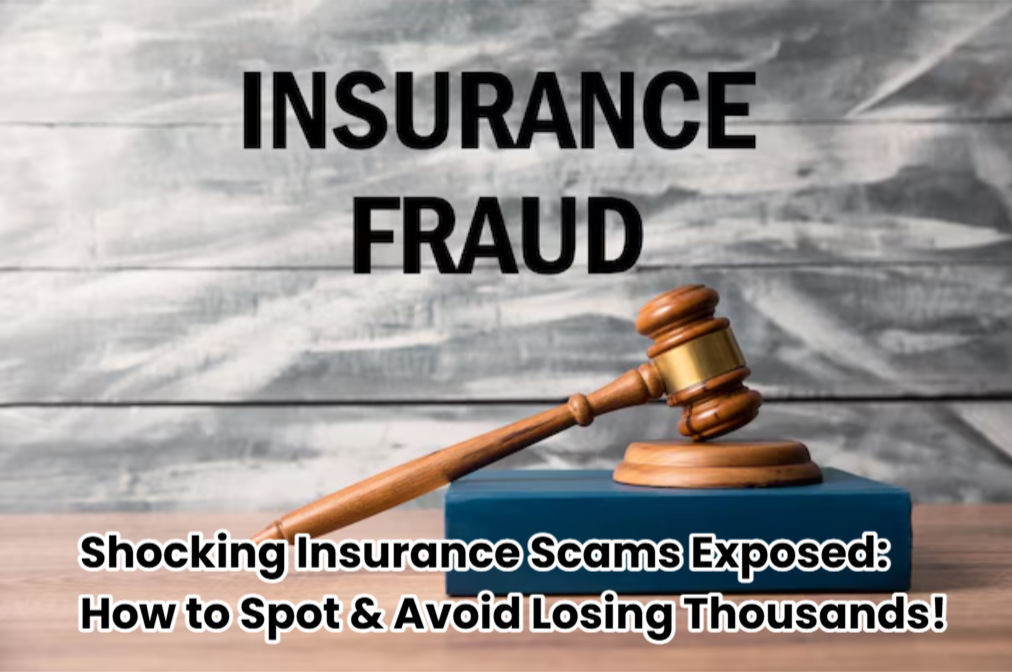Insurance is meant to provide financial protection and peace of mind, but scammers are always looking for ways to exploit the system. Insurance scams can be costly. They include fake insurance policies, staged accidents, and fraudulent claims. These scams can take thousands of dollars from individuals and businesses. Understanding how these scams work and how to avoid them is crucial for safeguarding your money and personal information.
In this guide, we’ll break down common insurance scams, explain red flags to watch out for, and provide actionable tips to protect yourself.

Common Types of Insurance Scams
1. Fake Insurance Policies
Fraudsters often sell fake insurance policies. This scam targets unsuspecting victims. These policies look real. They have professional documents, fake websites, and even fake customer service numbers.
- How It Works: Scammers pretend to be agents from real or fake insurance companies. They offer deals that sound too good to be true.
- Red Flags:
- Unusually low premiums compared to market rates.
- No verifiable online presence or company history.
- Pressure tactics urging you to buy immediately.
How to Avoid It:
- Always verify an insurance company’s credentials through your state’s insurance department.
- Contact the insurance company directly through official channels.
- Read online reviews and check with the Better Business Bureau (BBB).
2. Staged Accidents and Fraudulent Claims
Scammers create fake accidents or exaggerate real incidents to file fraudulent insurance claims.
- How It Works: They may cause a minor fender bender or fake a slip-and-fall accident to claim medical expenses and damages.
- Red Flags:
- Overly aggressive victims demanding immediate settlements.
- Witnesses who appear suspiciously prepared or rehearsed.
- Multiple claimants for minor accidents.
How to Avoid It:
- Always document accidents thoroughly with photos and witness statements.
- Report suspicious incidents to law enforcement and your insurance company.
- Never admit fault at an accident scene; let the investigation determine responsibility.
3. Health Insurance Fraud
Health insurance scams often involve medical providers, patients, or fraudsters submitting false claims.
- How It Works:
- Fraudulent billing for services that were never provided.
- Overbilling or double-billing for medical procedures.
- Selling fake health insurance plans.
- Red Flags:
- Billing for services or treatments you never received.
- Unexpected calls from people claiming to be health insurers.
- Requests for payment before services are provided.
How to Avoid It:
- Review all medical bills and statements carefully.
- Report any discrepancies to your insurer.
- Never provide personal or insurance information over the phone unless you initiated contact.
4. Life Insurance Scams
Life insurance scams range from identity theft to fraudulent policies and beneficiaries.
- How It Works:
- Fraudsters pose as beneficiaries and attempt to collect payouts.
- Fake insurance agents sell non-existent life insurance policies.
- Family members or fraudsters fake deaths to claim payouts.
- Red Flags:
- Unsolicited offers to buy life insurance.
- Sudden policy changes without your knowledge.
- Missing policy documents or undisclosed information.
How to Avoid It:
- Keep your life insurance documents secure and review them regularly.
- Verify any changes to your policy with your provider.
- Be wary of anyone pressuring you to name them as a beneficiary.
5. Auto Repair and Towing Scams
Some dishonest auto repair shops and tow truck drivers overcharge you. They may also do repairs that you don’t need after an accident.
- How It Works:
- Inflated repair estimates.
- Charging for parts or services that were never provided.
- Tow truck scams, where your car is taken to an unauthorized shop and held for ransom.
- Red Flags:
- Tow trucks arriving unsolicited at accident scenes.
- Mechanics refusing to give a written estimate.
- Being pressured to pay in cash upfront.
How to Avoid It:
- Only use reputable repair shops approved by your insurance provider.
- Always get written estimates before authorizing repairs.
- Call your insurer before accepting any tow services.
How to Protect Yourself from Insurance Scams
1. Do Your Research
Before purchasing any insurance policy, research the company and the agent thoroughly. Check for licensing and consumer complaints through your state’s insurance department.
2. Be Wary of Unsolicited Offers
If someone contacts you out of the blue offering an incredible insurance deal, be skeptical. Scammers often use high-pressure tactics to force quick decisions.
3. Verify Policy Details
Always read and understand the terms of your policy. If something seems unclear, ask questions or consult a trusted insurance professional.
4. Keep Detailed Records
Save copies of all your insurance documents, receipts, and correspondence. This can help resolve disputes and prove legitimacy if needed.
5. Report Suspicious Activity
If you suspect fraud, report it to your insurance provider, law enforcement, or the National Insurance Crime Bureau (NICB).
Must read:
- Shocking Truth About Travel Insurance: What’s Really Covered (and What’s Not!)
- Shocking Truth: Why You Can’t Afford to Skip Insurance in Today’s Uncertain World!
- Comprehensive vs. Collision Coverage: Shocking Differences You MUST Know Before It’s Too Late!
Frequently Asked Questions (FAQs)
How can I tell if an insurance company is legitimate?
What should I do if I suspect an insurance scam?
Why do insurance scams happen so often?
Can I get my money back if I fall for a fake insurance policy?
How can I avoid fake health insurance plans?
Conclusion
Insurance scams are a serious issue, costing individuals and businesses millions every year. The best defense is awareness—knowing the types of scams that exist, recognizing red flags, and taking steps to protect yourself. Check if insurance providers are legitimate. Read your policies closely. Report any suspicious activity right away. By staying informed, you can avoid falling victim to insurance fraud and ensure you have the real protection you need.
